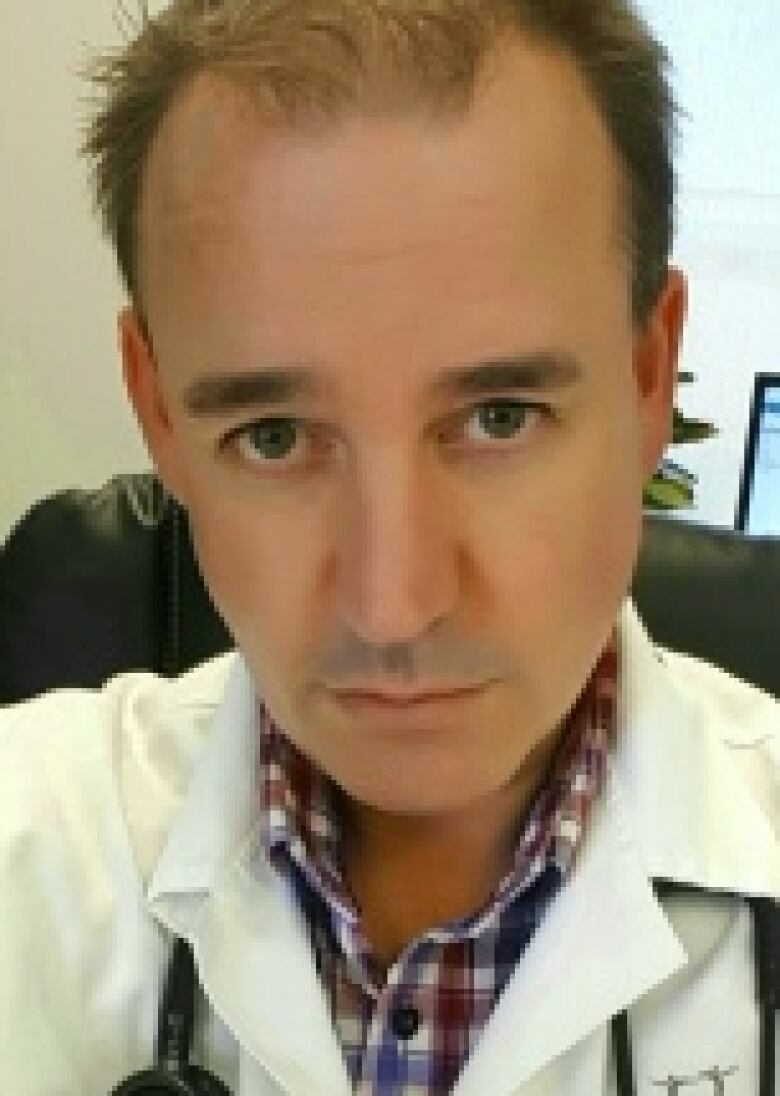Doctor posts his own finances online to make point about physician pay
'I was just feeling very frustrated ... because I know the reality is so different'

A doctor frustrated with what he sees as one-sided information coming from provincial health officialsis speaking out by putting his money where his mouth is.
Dr. Timothy Matheson recently postedhis financial information to his practice website to show exactly how he was paid and the expenses that go into operating as a doctor in Nova Scotia.
Mathesonoperates a family practice in Windsor and Bedford as well as doing hospital shifts in Windsor. He said he went public with his own financesin response to the province's newlimits onwhere doctors can work. For instance, new graduates would be restricted from taking shifts in walk-in clinics.
Gross versus net income
The financial information breaks down how Mathesonis paid when working at his office practice and how he is paid when he does on-call shifts in hospital.It also shows the expenses he has to pay out of his gross incomeand notes that doctors are responsible fortheir own pension, health and dental plans.
It also shows how much more difficult it is for a doctor to make money while operating an office.

"Some politicians have been spouting off numbers like the average is $300,000, and I was just feeling very frustrated by that because I know the reality is so different," Mathesonsaid.
While Matheson's gross revenue was a little more than $300,000, his net pay was less than $180,000.
Doctors typically don't say much publicly about what they make, how they run an office or how they're paid. But Matheson saidthat is starting to change as irritation increases with what he sees as incomplete information being released and a lack of focus on more pressing issues.
"We are in very ...serious times from my perspective," he said. "I really do feel that if we don't address this issue head-on, that we're going to have a system collapsing around us."
Part of that means involving everyone in the conversation about what needs to happen to improve the system, he said.
'Only half the message getting out there'
In recent weeks, government officials have confronted concerns about doctor shortages with the statistic that 90 per cent of Nova Scotians have a family doctor. Matheson, however, notes that the number was 97 per cent in 2005.
Another frustrating statistic for Matheson is that Nova Scotia has the highest number of doctors per capita in the country. While that might be true, he notes that the physician resource plan indicates a deficit of family doctors. He also worries that decisions are being made based on outdated data.
"When I see that only half of the message is getting out there, that becomes very frustrating for me and is sort of my call to service."
Important questions not being asked
All of this leaves Matheson feelingsignificantquestions about the future of the health-care system aren't being addressed because they are either too big or too difficult politically.
There is ongoing talk about how the province and health-care professionals need to change, butMatheson said there alsoneeds to be challengingconversations about howpeople accessthe system.
"If someone walks into an emergency room with a splinter in their finger, maybe that person has to pay $25 to have that splinter taken out because that's not an emergency service," he said.
"And I know that's really contentious stuff ...but if things are that bad off financially then we can't prop up the system just based on two legs; we need to have that other leg looked at."
Public deserves credit
While he doesn't profess to have all the answers, Matheson said there needs to be a more concerted effort to include as many people in the conversation about the future of healthcare, and that should include doctors and patients.
When it comes to re-examining the system and its operation, Mathesonsaid he thinks politicians underestimate the public and just assume the suggestion of fees of any kind will be instantly rejected and lead to outrage at the ballot box.
"I think that people are a lot smarter than that. For almost every person that comes into my office and talks to me about this, so many of them say, 'You know what, if there's no money I'm happy to pay $5 if I go to a walk-in clinic.'"












_(720p).jpg)


 OFFICIAL HD MUSIC VIDEO.jpg)
.jpg)



























































































